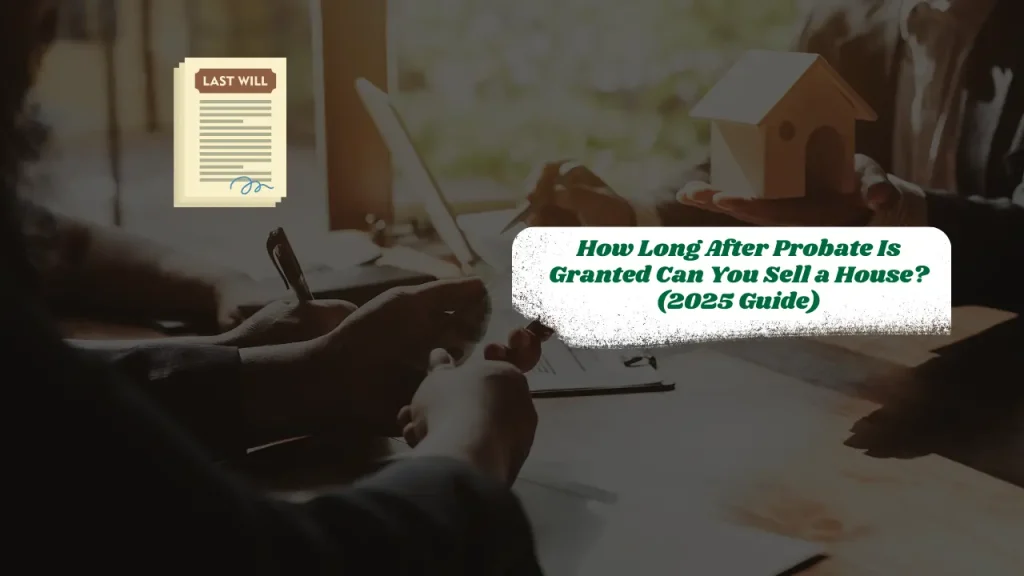How Long After Probate Is Granted Can You Sell a House? (2025 Guide)
Once probate is granted, you can typically list and sell a house within 2–6 weeks, assuming no legal disputes or delays. However, closing the sale (transferring ownership) often takes 30–90 days after probate, depending on state laws and buyer financing.
But there’s more to it. Below, we’ll explain the factors that speed up or slow down the process in 2025.
Selling a house after probate can feel like going through a long series of legal steps and waiting periods. If you’re an executor or beneficiary, you’re likely eager to finalize the estate—but timing is everything. In 2025, the answer to “How long after probate is granted can you sell a house?” hinges on your location, the estate’s complexity, and a few critical legal steps. Let’s break it down.
Table of Contents
Key Steps to Sell a House After Probate
- Obtain the Grant of Probate
- This legal document confirms your authority to manage the estate. In most states, it takes 2–8 weeks to receive after filing.
- Tip: Some states (e.g., California, Texas) allow executors to list the house before probate closes if the will permits it.
- Prepare the Property for Sale
- Clear personal belongings, address repairs, and order appraisals. This can take 1–4 weeks, depending on the home’s condition.
- List and Market the Home
- In a stable 2025 market, expect 1–3 months to find a buyer. Competitive markets (e.g., Florida, Arizona) may sell faster.
- Close the Sale
- After accepting an offer, closing typically takes 30–45 days (longer for probate-specific buyer requirements).
What Could Delay the Sale?
- State Probate Laws:
- California: Requires a 15-day “notice of proposed action” period for heirs to object.
- Florida: Mandates a 90-day creditor claims window before assets can be sold.
- Texas: Allows “independent administration,” letting executors sell faster without court approval.
- Disputes Among Heirs: Lawsuits or disagreements can freeze sales for 6+ months.
- IRS or Tax Issues: Unresolved estate taxes (federal or state) can delay closing.
- Buyer Financing: Mortgage approvals or probate-cash buyer requirements add time.
Related article for you:
Under What Circumstances Would Property Be Subject to Ancillary Probate?

2025 Updates to Know
- E-Filing Efficiency: Many states now expedite probate grants via online systems (e.g., Michigan’s “e-Probate” platform).
- Rising Interest Rates: Higher mortgage rates in 2025 may slow buyer demand, extending time on the market.
- Green Home Incentives: Energy-efficient probate homes in states like Colorado or New York may sell faster due to tax credits.
How to Speed Up the Process?
- File for Probate Immediately: Delays in filing push back your entire timeline.
- Work With a Probate Real Estate Specialist: Agents familiar with court requirements can avoid missteps.
- Pre-Approved Buyers Only: Require proof of funds or mortgage pre-approval to skip slow financing.
- Clear Title Early: Resolve liens, unpaid taxes, or ownership disputes before listing.
State-by-State Probate Sale Timelines (2025)
| State | Avg. Time to Sell After Probate Grant | Unique Requirements |
| California | 3–6 months | 15-day heir notice period |
| Texas | 1–3 months | No court approval needed for independent executors |
| Florida | 4–8 months | 90-day creditor period |
| New York | 4–7 months | Surrogate Court review for contested estates |
| Illinois | 2–5 months | Published notice to creditors (3 months) |
FAQs
Can heirs force a sale before probate closes?
Rarely. Most states require executors to complete probate first, unless all heirs agree.
Do I need court approval to sell?
It depends:
- Yes in states with “dependent administration” (e.g., Florida).
- No in “independent administration” states (e.g., Texas, Arizona).
How are sale proceeds distributed?
After paying debts/taxes, remaining funds go to heirs per the will (or state intestacy laws).
Bottom Line
While you can technically sell a house days after probate is granted, real-world timelines in 2025 range from 1–8 months due to legal steps, market conditions, and paperwork. To avoid hiccups:
- Consult a probate attorney todetermine state laws.
- Price the home competitively to attract faster offers.
- Stay proactive—delays cost money.
For personalized advice, contact your local probate court or a certified estate attorney. The sooner you start, the sooner you’ll close.
About the Author

Sarah Klein, JD, is an experienced estate planning attorney who has helped clients with wills, trusts, powers of attorney, and probate matters. At All About Lawyer, she simplifies complex estate laws so families can protect their assets, plan ahead, and avoid legal headaches during life’s most sensitive moments.
Read more about Sarah
